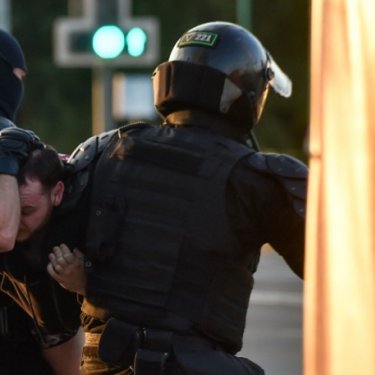Belarus poll – a dark day for press freedom

Reporters Without Borders (RSF) condemns the arrests and violence against journalists that followed the presidential election in Belarus on 9 August, a dark day for press freedom, and calls for the immediate release of all those still held.
Some of the violence began before the close of polls. Reporters for the independent news website Tut.by were forcibly removed from a polling station in Minsk although they were officially registered to cover the elections. After casting his vote at midday, President Alexander Lukashenko accused Tut.by of trying to “overthrow the government.”
Most of the incidents and arbitrary arrests occurred during the protests in more than 33 of the country’s cities and towns that began in the evening after the polling. The victims included Tut.by journalists Olga Kamianyagina and Angelika Vasilevskaya, who where detained in the western city of Grodno and in the eastern city of Mogilev. Both were later released.
The official representative of the Belarusian exile TV channel Belsat, Irina Slavnikova, suffered the same fate in Minsk. Two Belsat journalists also reported being detained: Ekaterina Tkachenko was arrested as she left her home, while Stanislav Ivachkevitch was arrested a few hours later, at around 9:30 p.m. According to RSF’s information, he has still not been released.
Foreign journalists beaten, detained and deported
Three journalists with the Russian TV channel Dozhd, Vladimir Romenski, Vasili Polonski and Nikolai Antipov, were subjected to heavy-handed arrests by plainclothes police in Minsk. After being pressed to the ground, they were held for several hours because they had no accreditation and were finally deported to Russia late that evening. Dozhd’s editor-in-chief said the channel submitted a request for accreditation in June but didn’t hear back.
The victims of violence included Associated Press photographer Mstyslav Chernov, who was rushed to hospital with severe injuries, and Maxim Solopov, a special correspondent for the Russian news website Meduza, who was badly beaten while covering protests in Minsk. Contact was lost with him at 1:30 a.m. yesterday. He was released this evening.
Anton Starkov and Dmitri Lasenko, reporters for Russia’s Daily Storm, reported being badly clubbed when arrested. They were released shortly afterwards. While in the middle of a crowd of protesters in Minsk, Alexander Skrylnikov, a reporter for the Russian news website MBK Media, was hit by a stun grenade, a device that the riot police denied using.
Evgeniy Oleynik, a reporter for the Russia media outlet Sputnik Belarus, reported being beaten and detained for several hours yesterday morning after taking a photo of a police vehicle. Semyon Pegov, a reporter for the Russian daily Komsomolskaya Pravda, was arrested by the Minsk police and released earlier today.
Belsat journalists Alexei Kairis and Alexander Saenko were arrested in Grodno on 9 August, while Jan Roman, a reporter for the Polish broadcaster Polsat, was arrested yesterday afternoon. Belsat reporters Dmitri Kazakevich and Viatcheslav Lazarev and Igor Matveev, a reporter and photographer for the local news site Narodnye Novosti Vitebsk, were briefly detained in the northeastern city of Vitebsk.
“The crackdown on Belarusian journalists is tantamount to a witchhunt,” said Jeanne Cavelier, the head of RSF’s Eastern Europe and Central Asia desk. “The police violence against journalists and the many arrests of media personnel are inconceivable in Europe and completely contrary to Belarus’s obligations as an OSCE member.”
More than 3,000 people were reportedly arrested during the protests, which continued until 3 a.m. yesterday. One person was killed and dozens were injured as a result of the police crackdown. More violence was reported on the streets of Minsk yesterday evening, when Natalia Lubnevskaya, a reporter for the Belarusian daily Nasha Niva, was injured in the leg by a rubber bullet during a new protest.
Internet blackout
Internet cuts began being reported on the morning the election and continued to hamper the work of the media throughout the day. Journalists reported network disruptions on the services of several access providers, and difficulties accessing leading news sites, YouTube and Telegram. At around 9 p.m., one hour after the close of polls and the announcement that Lukashenko had been reelected with 80.2% of the vote, almost all Belarusian news sites suddenly stopped working.
Both the Internet and mobile communications continue to experience major disruptions. Unofficial exit polls gave Lukashenko only 10% of the vote, while his chief rival, Svetlana Tikhanovskaya, reportedly won more than 70%. She asked Lukashenko to stop down yesterday. After spending several hours at the headquarters of the electoral commission last night, she finally left Belarus and went to Lithuania this morning.
Ruled since 1994 by Lukashenko, who until now has been reelected in the first round every five years, Belarus is ranked 153rd out of 180 countries in RSF’s 2020 World Press Freedom Index.



